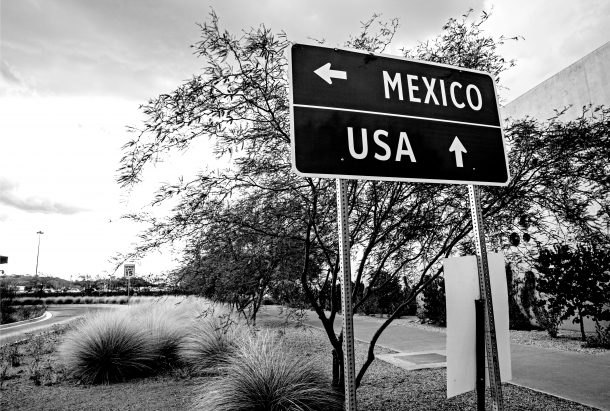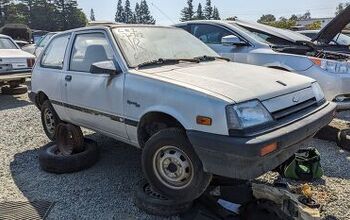It's Monday, and Mexican Tariffs Are Back On the Table

After the United States and Mexico signed an agreement to stem the flow of illegal migrants from Central America across their shared border, President Donald Trump’s latest tariff proposal was taken off the table. You could almost hear the sphincters of every global automaker collectively unclench in that moment. Unfortunately, their rectal vacation appears to have been short lived.
“We have fully signed and documented another very important part of the Immigration and Security deal with Mexico, one that the U.S. has been asking about getting for many years. It will be revealed in the not too distant future and will need a vote by Mexico’s legislative body,” Trump tweeted on Monday. “We do not anticipate a problem with the vote but, if for any reason the approval is not forthcoming, tariffs will be reinstated!”
Last month the president threatened a 5 percent tariff on Mexican goods, with duties gradually increasing to 25 percent by October, if the country didn’t agree to curtail illegal immigration across its borders. Fortunately, the issue was settled by Friday and the tariff threat was taken off the table.
However, according to a report from The New York Times published over the weekend, multiple aspects of the deal had been agreed upon months in advance. Among them was a pledge from Mexico to deploy its National Guard throughout the country, with priority given to its porous southern border. The Times claims the Mexican government had already pledged to do just that in March during clandestine meetings between Kirstjen Nielsen, then the secretary of homeland security, and Olga Sanchez, the Mexican secretary of the interior.
It also said that an expansion of a program to allow asylum seekers to remain in Mexico while their legal cases proceed had been finalized in December, with Nielsen announcing the Migrant Protection Protocols during a hearing of the House Judiciary Committee just before Christmas.
Trump called the piece a “hit job” and suggested that it misrepresented the larger issue while also underreporting additional changes Mexico had planned. He reinstated the tariff threat at roughly the same time. Sadly, the full scope of the two countries newly agreed-upon immigration strategy is not yet known.
Mexican Foreign Minister Marcelo Ebrard wrote in a tweet Monday that he plans to brief Mexican President Andres Manuel Lopez Obrador on the details of the agreement today. Meanwhile, the Mexican ambassador to the United States, Marta Barcena Coqui, told American media outlets that her country’s ultimate goal is to help bring down illegal immigration into the U.S. to levels at or before 2018.
With Mexico appearing relatively eager to work with the United States in slowing the flow of illegal immigrants, it seems unlikely that this follow-up tariff threat is anything too serious. However, if the government backs out of the deal, Trump appears willing to push forward with the fees. Assuming that’s how things go, automobile producers with ties to Mexico will likely be confronting sizable hits to their bottom line. Last week, Deutsche Bank estimated that General Motors faced a $6.3 billion hit had the tariff grown to 25 percent. Fees of that magnitude would undoubtedly trickle down to consumers via increased price.
[Image: Chess Ocampo/Shutterstock]

A staunch consumer advocate tracking industry trends and regulation. Before joining TTAC, Matt spent a decade working for marketing and research firms based in NYC. Clients included several of the world’s largest automakers, global tire brands, and aftermarket part suppliers. Dissatisfied with the corporate world and resentful of having to wear suits everyday, he pivoted to writing about cars. Since then, that man has become an ardent supporter of the right-to-repair movement, been interviewed on the auto industry by national radio broadcasts, driven more rental cars than anyone ever should, participated in amateur rallying events, and received the requisite minimum training as sanctioned by the SCCA. Handy with a wrench, Matt grew up surrounded by Detroit auto workers and managed to get a pizza delivery job before he was legally eligible. He later found himself driving box trucks through Manhattan, guaranteeing future sympathy for actual truckers. He continues to conduct research pertaining to the automotive sector as an independent contractor and has since moved back to his native Michigan, closer to where the cars are born. A contrarian, Matt claims to prefer understeer — stating that front and all-wheel drive vehicles cater best to his driving style.
More by Matt Posky
Latest Car Reviews
Read moreLatest Product Reviews
Read moreRecent Comments
- Slavuta Autonomous cars can be used by terrorists.
- W Conrad I'm not afraid of them, but they aren't needed for everyone or everywhere. Long haul and highway driving sure, but in the city, nope.
- Jalop1991 In a manner similar to PHEV being the correct answer, I declare RPVs to be the correct answer here.We're doing it with certain aircraft; why not with cars on the ground, using hardware and tools like Telsa's "FSD" or GM's "SuperCruise" as the base?Take the local Uber driver out of the car, and put him in a professional centralized environment from where he drives me around. The system and the individual car can have awareness as well as gates, but he's responsible for the driving.Put the tech into my car, and let me buy it as needed. I need someone else to drive me home; hit the button and voila, I've hired a driver for the moment. I don't want to drive 11 hours to my vacation spot; hire the remote pilot for that. When I get there, I have my car and he's still at his normal location, piloting cars for other people.The system would allow for driver rest period, like what's required for truckers, so I might end up with multiple people driving me to the coast. I don't care. And they don't have to be physically with me, therefore they can be way cheaper.Charge taxi-type per-mile rates. For long drives, offer per-trip rates. Offer subscriptions, including miles/hours. Whatever.(And for grins, dress the remote pilots all as Johnnie.)Start this out with big rigs. Take the trucker away from the long haul driving, and let him be there for emergencies and the short haul parts of the trip.And in a manner similar to PHEVs being discredited, I fully expect to be razzed for this brilliant idea (not unlike how Alan Kay wasn't recognized until many many years later for his Dynabook vision).
- B-BodyBuick84 Not afraid of AV's as I highly doubt they will ever be %100 viable for our roads. Stop-and-go downtown city or rush hour highway traffic? I can see that, but otherwise there's simply too many variables. Bad weather conditions, faded road lines or markings, reflective surfaces with glare, etc. There's also the issue of cultural norms. About a decade ago there was actually an online test called 'The Morality Machine' one could do online where you were in control of an AV and choose what action to take when a crash was inevitable. I think something like 2.5 million people across the world participated? For example, do you hit and most likely kill the elderly couple strolling across the crosswalk or crash the vehicle into a cement barrier and almost certainly cause the death of the vehicle occupants? What if it's a parent and child? In N. America 98% of people choose to hit the elderly couple and save themselves while in Asia, the exact opposite happened where 98% choose to hit the parent and child. Why? Cultural differences. Asia puts a lot of emphasis on respecting their elderly while N. America has a culture of 'save/ protect the children'. Are these AV's going to respect that culture? Is a VW Jetta or Buick Envision AV going to have different programming depending on whether it's sold in Canada or Taiwan? how's that going to effect legislation and legal battles when a crash inevitibly does happen? These are the true barriers to mass AV adoption, and in the 10 years since that test came out, there has been zero answers or progress on this matter. So no, I'm not afraid of AV's simply because with the exception of a few specific situations, most avenues are going to prove to be a dead-end for automakers.
- Mike Bradley Autonomous cars were developed in Silicon Valley. For new products there, the standard business plan is to put a barely-functioning product on the market right away and wait for the early-adopter customers to find the flaws. That's exactly what's happened. Detroit's plan is pretty much the opposite, but Detroit isn't developing this product. That's why dealers, for instance, haven't been trained in the cars.


































Comments
Join the conversation
I've closely followed these Trump generated emergencies and poor judgements for a while now and the comments both for and against. There is one thing common in the TTAC comments missing, how the USA is viewed externally by both sides of the fence and the effects and the accelerated pace of erosion of US dominance. Here is a list of REAL and future challenges confronting US power, influence and wealth, even the US falling further behind the 8 ball with a technological advantage, which slips daily; 1. Diminishing US power: Trump and his followers whine about how little investment is made by Allies and friends in their militaries. So, if the rest of the World ups military spending by 1%, how much does the US now need to invest to maintain its dominance? With Trump's blatant abuse of Allies how prepared are they to defend US interests especially with the poor negotiating skills of Trump and his representatives offending and creating angst. Since the US is only 20% of the global economy, my guess the US now needs to up defence spending by a couple of percent. 6% 2. Influence: The US is now less influencal then since before WW2. Trump is ripping up Treaties, Trade Deals and backing down on his own deals. Even this NAFTA issue is a Trump generated joke. How many countries will deal with the US when a deal is cut, then the US dismisses the deal with threats of increasing taxes? Iran, Paris Accord and the area where US influence could of been most significant in boxing in China, the Trans Pacific Trade Deal Trump backed out of. Wealth: The US will experience, a gradual downturn in standard of living as countries don't offer what the US wants. So far the global community has not imposed tariffs on each other. The US has imposed tariffs on all, increasing the costs of all US manufactured goods, the very thing you don't want if you want to export. To top it off the US consumer are paying for these tariffs. Then the countries impose counter tariffs on the exported US goods. How fncking dumb by Trump. Technology: The US is finding tech competition increasing, why? Because tech is becoming more acessable, like mass production tech. Tech can be bought off the shelf and the US leads in chips, aviation and space. With the restrictions placed on China will force the Chinese to rapidly develop its tech industries, not retard its development as Trump thinks. The US is not propping up the World as many think, as whatever the US makes can pretty much be had outside of the US, generally of better quality and cheaper. The issues confronting the US are mainly internal, not caused by others. Your massive inequality, low pay, poor social welfare and expensive costs. Its easier to blame others for your own problems rather than resolve them yourselves. The US is rich with a great standard of living, so, how hard done by are you guys? You Trump supporters sound like a group of insecure teenagers told to leave home and confront the world. Stop whining and do something yourselves to MAGA. Its not the World's job to do this for you. Grow up.
Wow, where did the intolerance come from? I'm aware that economics and international relations (history) aren't taught much anymore, but people should have the sense to understand the basic issues and that there are differences of opinion without insulting those who express them. It's fortunate polite Canadians are in charge, the founder, Robert Farago, would have banned several people in this thread for insulting other commenters and not contributing to the discussion.